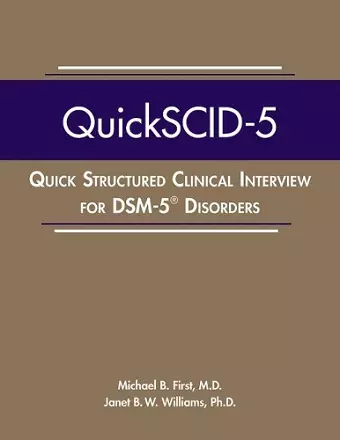Quick Structured Clinical Interview for DSM-5® Disorders (QuickSCID-5)
Janet B W Williams author Michael B First author
Format:Paperback
Publisher:American Psychiatric Association Publishing
Published:23rd Jan '21
Currently unavailable, our supplier has not provided us a restock date

QuickSCID-5 is a fully structured diagnostic instrument that employs interview questions adapted from the Structured Clinical Interview for DSM-5 (SCID-5), widely regarded to be the "gold standard" structured psychiatric diagnostic interview since the initial release of SCID in 1985. The impetus for developing the QuickSCID-5 was to create a briefer, more time-efficient version of the SCID designed to be administered usually in 30 minutes or less. The shorter administration time results from the fact that QuickSCID-5 consists almost entirely of closed-ended questions that can be answered "YES" or "NO" by the patient, dispensing with the requirement in the standard SCID that the interviewer elicit descriptive examples and ask enough follow-up questions until the interviewer has enough information to determine whether the DSM-5 diagnostic criteria are met. Consequently, unlike the standard SCID, which requires the interviewer to have specialized training in diagnostic interviewing, QuickSCID can be administered by any clinician, including those in training. Other features include a visually appealing format and easy to follow skip instructions.
QuickSCID has a modular design so that only modules of interest need be administered. Modules include an optional Overview, Module A (Mood Episodes and Disorders), Module B (Psychotic Symptoms Screen), Module C (Alcohol and Other Substance Use Disorders), Module D (Anxiety Disorders), Module E (Obsessive-Compulsive Disorder); Module F (Adult Attention-Deficit/Hyperactivity Disorder), Module G (Posttraumatic Stress Disorder), Module H (Eating Disorders), Module I (Screening for Other Disorders), and Module J (Rule Out Mental Disorders Due to a Medical Condition and Substance/Medication-induced Mental Disorders). In recognition of the fact that it is not recommended to make a diagnosis of a psychotic disorder such as schizophrenia using questions that can only be answered "YES" or "NO," QuickSCID-5 only screens for psychotic symptoms and is not intended to be used to diagnose psychotic disorders. These diagnoses are not included in QuickSCID-5.
Although the absence of a requirement for the interviewer to elicit descriptive examples may lead to more false positives than the standard SCID, the savings in administration time and its allowance for it to be administered by less trained interviewers can constitute a reasonable trade-off depending on the setting (e.g., for screening patients for the presence of a mental disorder).
Purchase includes a license to photocopy for private clinical assessment use, up to 200 total copies per customer.
>QuickSCID-5 is a reliable structured diagnostic tool that can be administered rapidly in a clinical setting by a wide variety of individuals. Where the full SCID is applicable to research settings, it frequently is too time consuming for clinical settings. The QuickSCID-5 helps resolve that issue and will help clinicians formulate a more accurate symptom-oriented DSM-5 diagnosis, which should be the starting point in formulating treatment recommendations for most patients. It is also an excellent tool to use in training environments to teach the questions one should ask when making these types of diagnoses.
-- Michael Easton, MD * DooISBN: 9781615373635
Dimensions: unknown
Weight: 177g
61 pages